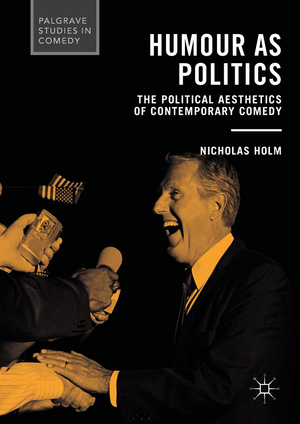Humour as Politics: The Political Aesthetics of Contemporary Comedy: Palgrave Studies in Comedy
Autor Nicholas Holmen Limba Engleză Hardback – 23 oct 2017
This book argues that recent developments in contemporary comedy have changed not just the way we laugh but the way we understand the world. Drawing on a range of contemporary televisual, cinematic and digital examples, from Seinfeld and Veep to Family Guy and Chappelle’s Show, Holm explores how humour has become a central site of cultural politics in the twenty-first century. More than just a form of entertainment, humour has come to play a central role in the contemporary media environment, shaping how we understand ideas of freedom, empathy, social boundaries and even logic. Through an analysis of humour as a political and aesthetic category, Humour as Politics challenges older models of laughter as a form of dissent and instead argues for a new theory of humour as the cultural expression of our (neo)liberal moment.
| Toate formatele și edițiile | Preț | Express |
|---|---|---|
| Paperback (1) | 734.93 lei 38-44 zile | |
| Springer International Publishing – 23 aug 2018 | 734.93 lei 38-44 zile | |
| Hardback (1) | 894.16 lei 6-8 săpt. | |
| Springer International Publishing – 23 oct 2017 | 894.16 lei 6-8 săpt. |
Din seria Palgrave Studies in Comedy
- 20%
 Preț: 752.75 lei
Preț: 752.75 lei - 15%
 Preț: 642.68 lei
Preț: 642.68 lei - 15%
 Preț: 698.15 lei
Preț: 698.15 lei - 18%
 Preț: 728.11 lei
Preț: 728.11 lei - 15%
 Preț: 699.28 lei
Preț: 699.28 lei - 15%
 Preț: 649.22 lei
Preț: 649.22 lei - 15%
 Preț: 646.43 lei
Preț: 646.43 lei - 15%
 Preț: 503.83 lei
Preț: 503.83 lei -
 Preț: 382.36 lei
Preț: 382.36 lei -
 Preț: 420.02 lei
Preț: 420.02 lei -
 Preț: 386.61 lei
Preț: 386.61 lei - 11%
 Preț: 689.87 lei
Preț: 689.87 lei -
 Preț: 388.72 lei
Preț: 388.72 lei - 15%
 Preț: 696.02 lei
Preț: 696.02 lei - 15%
 Preț: 640.06 lei
Preț: 640.06 lei -
 Preț: 381.43 lei
Preț: 381.43 lei - 18%
 Preț: 782.57 lei
Preț: 782.57 lei - 15%
 Preț: 638.76 lei
Preț: 638.76 lei - 18%
 Preț: 891.17 lei
Preț: 891.17 lei -
 Preț: 387.58 lei
Preț: 387.58 lei
Preț: 894.16 lei
Preț vechi: 1090.44 lei
-18% Nou
Puncte Express: 1341
Preț estimativ în valută:
171.13€ • 178.18$ • 144.62£
171.13€ • 178.18$ • 144.62£
Carte tipărită la comandă
Livrare economică 11-25 martie
Preluare comenzi: 021 569.72.76
Specificații
ISBN-13: 9783319509495
ISBN-10: 3319509497
Pagini: 252
Ilustrații: XII, 223 p. 12 illus. in color.
Dimensiuni: 148 x 210 x 21 mm
Greutate: 0.54 kg
Ediția:1st ed. 2017
Editura: Springer International Publishing
Colecția Palgrave Macmillan
Seria Palgrave Studies in Comedy
Locul publicării:Cham, Switzerland
ISBN-10: 3319509497
Pagini: 252
Ilustrații: XII, 223 p. 12 illus. in color.
Dimensiuni: 148 x 210 x 21 mm
Greutate: 0.54 kg
Ediția:1st ed. 2017
Editura: Springer International Publishing
Colecția Palgrave Macmillan
Seria Palgrave Studies in Comedy
Locul publicării:Cham, Switzerland
Cuprins
1. Introduction: Living in Comic Times.- 2. Dissent in Jest: Humour in the Liberal Moment.- 3. Telling Jokes to Power: The (A)Political Work of Humour.- 4. Humour without Anaesthetic: The Discomfort of Reality Comedy.- 5. Humour without Pity: The Scandal of Provocative Humour.- 6. Humour without Reason: The Nonsense of Absurd Humour.- 7. All That is Solid Collapses into Giggles: Examining the Political Aesthetics of Contemporary Humour.- 8. Conclusion: The Last Laugh.
Recenzii
“Holm provides deeper insight into the political work of humor in general, observing how the logic of humor might affect our current thinking about liberalism, authority, and dissent. … It provides many conceptual insights and will be of interest to academics in humor studies. … This book is a good start at engaging with comic content from across a few countries in the Western world, through an interdisciplinary lens.” (Veena Raman, International Journal of Communication, Iss (12), 2018)
Notă biografică
Nicholas Holm is a lecturer in Media Studies at Massey University, New Zealand. He has written widely on the politics and aesthetics of popular culture, in particular contemporary humour. He is author of Advertising and Society: A Critical Introduction (2016).
Textul de pe ultima copertă
This book argues that recent developments in contemporary comedy have changed not just the way we laugh but the way we understand the world. Drawing on a range of contemporary televisual, cinematic and digital examples, from Seinfeld and Veep to Family Guy and Chappelle’s Show, Holm explores how humour has become a central site of cultural politics in the twenty-first century. More than just a form of entertainment, humour has come to play a central role in the contemporary media environment, shaping how we understand ideas of freedom, empathy, social boundaries and even logic. Through an analysis of humour as a political and aesthetic category, Humour as Politics challenges older models of laughter as a form of dissent and instead argues for a new theory of humour as the cultural expression of our (neo)liberal moment.
Caracteristici
Presents a new theory of humour as the cultural expression of our (neo)liberal moment Revisits existing humour texts in order to rethink both the political limitations and possibilities of humour as a political mode in the twenty-first century Brings together concerns of form and aesthetics with questions of power in a manner that not only reassesses the cultural work of humour, but also articulates a new account of the political possibilities of popular aesthetics more broadly Includes supplementary material: sn.pub/extras
